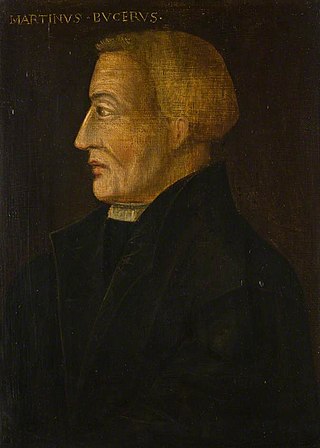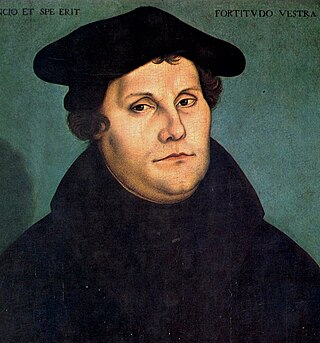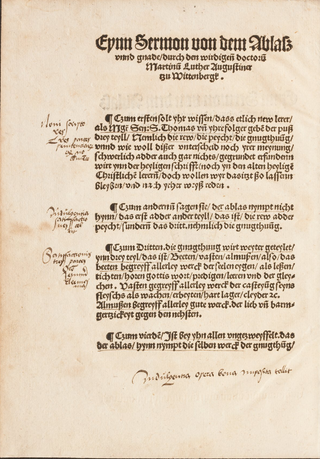
Martin Bucer was a German Protestant reformer based in Strasbourg who influenced Lutheran, Calvinist, and Anglican doctrines and practices. Bucer was originally a member of the Dominican Order, but after meeting and being influenced by Martin Luther in 1518 he arranged for his monastic vows to be annulled. He then began to work for the Reformation, with the support of Franz von Sickingen.

Johannes Oecolampadius was a German Protestant reformer in the Calvinist tradition from the Electoral Palatinate. He was the leader of the Protestant faction in the Baden Disputation of 1526, and he was one of the founders of Protestant theology, engaging in disputes with Erasmus, Huldrych Zwingli, Martin Luther and Martin Bucer. Calvin adopted his view on the Eucharist dispute.

Wolfgang Fabricius Capito was a German Protestant reformer in the Calvinist tradition.

The Ninety-five Theses or Disputation on the Power and Efficacy of Indulgences is a list of propositions for an academic disputation written in 1517 by Martin Luther, then a professor of moral theology at the University of Wittenberg, Germany. The Theses is retrospectively considered to have launched the Protestant Reformation and the birth of Protestantism, despite various proto-Protestant groups having existed previously. It detailed Luther's opposition to what he saw as the Roman Catholic Church's abuse and corruption by Catholic clergy, who were selling plenary indulgences, which were certificates supposed to reduce the temporal punishment in purgatory for sins committed by the purchasers or their loved ones.

Frederick III, also known as Frederick the Wise, was Prince-elector of Saxony from 1486 to 1525, who is mostly remembered for the protection given to his subject Martin Luther, the seminal figure of the Protestant Reformation. Frederick was the son of Ernest, Elector of Saxony and his wife Elisabeth, daughter of Albert III, Duke of Bavaria.

Disputation is a genre of literature involving two contenders who seek to establish a resolution to a problem or establish the superiority of something. An example of the latter is in Sumerian disputation poems.

In Christian theology, synergism refers to the cooperative effort between God and humanity in the process of salvation. Before Augustine of Hippo (354–430), synergism was almost universally endorsed. It characterized the so-called Semi-Pelagian position. It also characterized the position of the Second Council of Orange (529), often referred to as Semi-Augustinian. Synergism is affirmed by both the Catholic Church, and Eastern Orthodoxy. It is also present in various Protestant denominations, such as Anabaptist Churches, and is particularly prominent in those influenced by Arminian theology, such as the Methodist Churches.

The history of the Calvinist–Arminian debate begins in the early 17th century in the Netherlands with a Christian theological dispute between the followers of John Calvin and Jacobus Arminius and continues today among some Protestants, particularly evangelicals. The debate centers around soteriology and includes disputes about total depravity, predestination, and atonement. While the debate was given its Calvinist–Arminian form in the 17th century, issues central to the debate have been discussed in Christianity in some form since Augustine of Hippo's disputes with the Pelagians in the 5th century.

Paul Fagius was a Renaissance scholar of Biblical Hebrew and Protestant reformer.

The theology of the Cross or staurology is a term coined by the German theologian Martin Luther to refer to theology that posits "the cross" as the only source of knowledge concerning who God is and how God saves. It is contrasted with the "theology of glory", which places greater emphasis on human abilities and human reason.
Lutheranism as a religious movement originated in the early 16th century Holy Roman Empire as an attempt to reform the Catholic Church. The movement originated with the call for a public debate regarding several issues within the Catholic Church by Martin Luther, then a professor of Bible at the young University of Wittenberg. Lutheranism soon became a wider religious and political movement within the Holy Roman Empire owing to support from key electors and the widespread adoption of the printing press. This movement soon spread throughout northern Europe and became the driving force behind the wider Protestant Reformation. Today, Lutheranism has spread from Europe to all six populated continents.

The theology of Martin Luther was instrumental in influencing the Protestant Reformation, specifically topics dealing with justification by faith, the relationship between the Law and Gospel, and various other theological ideas. Although Luther never wrote a systematic theology or a "summa" in the style of St. Thomas Aquinas, many of his ideas were systematized in the Lutheran Confessions.

Martin Luther was a German priest, theologian, author, hymnwriter, professor, and Augustinian friar. Luther was the seminal figure of the Protestant Reformation, and his theological beliefs form the basis of Lutheranism. He is widely regarded as one of the most influential figures in Western and Christian history.

The theology of Ulrich Zwingli was based on an interpretation of the Bible, taking scripture as the inspired word of God and placing its authority higher than what he saw as human sources such as the ecumenical councils and the church fathers. He also recognised the human element within the inspiration, noting the differences in the canonical gospels. Zwinglianism is the Reformed confession based on the Second Helvetic Confession promulgated by Zwingli's successor Heinrich Bullinger in the 1560s.

The Leipzig Debate was a theological disputation originally between Andreas Karlstadt, Martin Luther and Johann Eck. Karlstadt, the dean of the Wittenberg theological faculty, felt that he had to defend Luther against Eck's critical commentary on the 95 Theses and so challenged Johann Eck, a professor of theology at the University of Ingolstadt, to a public debate concerning the doctrines of free will and grace.

Martin Luther's Sermon on Indulgences and Grace is a pamphlet written in Wittenberg in the latter part of March, 1518 and published in April of that year.
The two kinds of righteousness is a Lutheran paradigm. It attempts to define man's identity in relation to God and to the rest of creation. The two kinds of righteousness is explicitly mentioned in Luther's 1518 sermon entitled "Two Kinds of Righteousness", in Luther's Commentary on the Epistle to the Galatians (1535), in his On the Bondage of the Will, Melanchthon's Apology of the Augsburg Confession, and in the third article of the Formula of Concord. It is also the implicit presupposition governing Luther's On the Freedom of a Christian as well as other works.

Deus revelatus refers to the Christian theological concept coined by Martin Luther which affirms that the ultimate self-revelation of God relies on his hiddenness. It is the particular focus of Luther’s work the Heidelberg Theses of 1518, presented during the Heidelberg disputation of 1518. In Christian theology, God is presented as revealed or Deus revelatus through the suffering of Jesus Christ on the cross. Debate of the term is found in the field of philosophy of religion, where it is contested among philosophers such as J. L. Schellenberg. The term is usually distinguished from Luther's concept of Deus absconditus, which affirms the fundamental unknowability of the essence of God. However, Luther proposed that God is a revelation who uses the fog to obscure himself. This distinction which permeates his theology has been the subject of wide interpretation, leading to controversy between theologians who believe the terms to be either antithetical or identical. These two conflicting strands of thought present the main problem when interpreting Luther’s doctrine of the Revealed God. In recent years the term has been used to inform modern analysis of religious themes such as evolution.
Kaspar Megander was a Swiss reformer in Zürich and Bern who supported Huldrych Zwingli and was influential in the early years of the Swiss Reformation.
The Bern Disputation was a debate over the theology of the Swiss Reformation that occurred in Bern from 6 to 26 January 1528 that ended in Bern becoming the second Swiss canton to officially become Protestant.



















